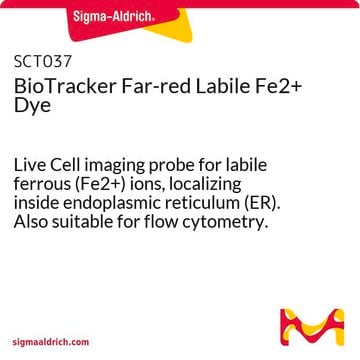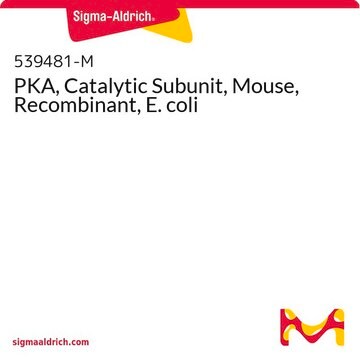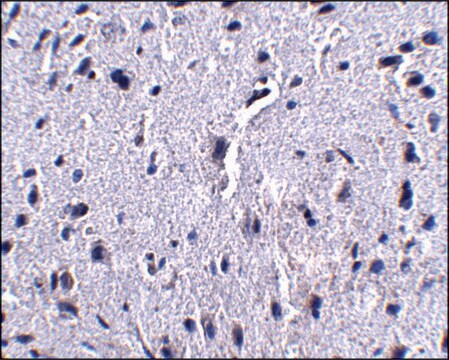14-309
PCAF Protein, Active, 50 µg
PCAF recombinant GST fusion protein, for use in Histone Acetyltransferase Assays. (HAT).
Se connecterpour consulter vos tarifs contractuels et ceux de votre entreprise/organisme
About This Item
Code UNSPSC :
12352202
eCl@ss :
32160405
Nomenclature NACRES :
NA.32
Produits recommandés
Produit recombinant
expressed in E. coli
Niveau de qualité
Poids mol.
Mw 79 kDa
Fabricant/nom de marque
Upstate®
Technique(s)
activity assay: suitable (histone acetyltransferase (HAT))
Numéro d'accès NCBI
Numéro d'accès UniProt
Conditions d'expédition
dry ice
Description générale
Product Source: expressed in E. Coli corresponding to amino acids 352-832
Qualité
routinely evaluated by acetylation of core histones in vitro
Autres remarques
For Specific Activity data, refer to the Certificate of Analysis for individual lots of this enzyme.
Informations légales
UPSTATE is a registered trademark of Merck KGaA, Darmstadt, Germany
Code de la classe de stockage
10 - Combustible liquids
Classe de danger pour l'eau (WGK)
WGK 1
Certificats d'analyse (COA)
Recherchez un Certificats d'analyse (COA) en saisissant le numéro de lot du produit. Les numéros de lot figurent sur l'étiquette du produit après les mots "Lot" ou "Batch".
Déjà en possession de ce produit ?
Retrouvez la documentation relative aux produits que vous avez récemment achetés dans la Bibliothèque de documents.
Prabhat Kumar Purbey et al.
Molecular and cellular biology, 29(5), 1321-1337 (2008-12-24)
Special AT-rich binding protein 1 (SATB1) acts as a global regulator of gene expression by recruiting various corepressor or coactivator complexes, thereby establishing a unique chromatin structure at its genomic targets in a context-dependent manner. Although SATB1 acts predominantly as
Matteo Savoia et al.
FASEB journal : official publication of the Federation of American Societies for Experimental Biology, 33(3), 4107-4123 (2018-12-12)
The epigenetic enzyme p300/CBP-associated factor (PCAF) belongs to the GCN5-related N-acetyltransferase (GNAT) family together with GCN5. Although its transcriptional and post-translational function is well characterized, little is known about its properties as regulator of cell metabolism. Here, we report the
Giosalba Burgio et al.
Journal of enzyme inhibition and medicinal chemistry, 31(sup3), 75-82 (2016-07-09)
Histones and polyamines are important determinants of the chromatin structure. Histones form the core of nucleosome particles and their modification by acetylation of N-terminal tails is involved in chromatin structural changes and transcriptional regulation. Polyamines, including spermidine, are also targets
Steven E Lang et al.
Oncogene, 22(18), 2836-2841 (2003-05-14)
The adenovirus E1A oncoprotein stimulates cell growth and inhibits differentiation by deregulating the normal transcription program via interaction with positive and negative cellular effectors. E1A associates with transcriptional regulatory complexes containing p400 and TRRAP involved in chromatin remodeling and decondensation.
Chromosomal protein HMGN1 enhances the acetylation of lysine 14 in histone H3.
Jae-Hwan Lim,Katherine L West,Yaffa Rubinstein,Michael Bergel,Yuri V Postnikov,Michael Bustin
The Embo Journal null
Notre équipe de scientifiques dispose d'une expérience dans tous les secteurs de la recherche, notamment en sciences de la vie, science des matériaux, synthèse chimique, chromatographie, analyse et dans de nombreux autres domaines..
Contacter notre Service technique







